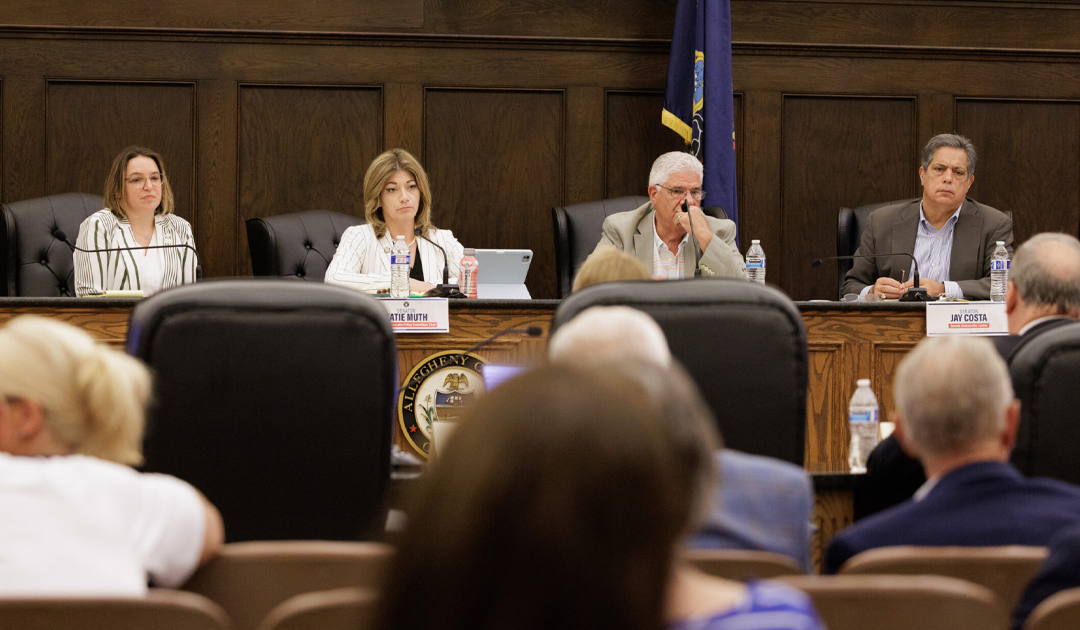PITTSBURGH, July 16, 2024 – State Senator Katie Muth (D-Chester/Montgomery/Berks), chair of the Pennsylvania Senate Democratic Policy Committee, joined Sen. Wayne Fontana (D-Allegheny) yesterday in Pittsburgh to co-host a public hearing highlighting Pennsylvania’s system of property reassessment.
“Yesterday’s hearing highlighted the many issues caused by Pennsylvania’s lack of statewide property reassessment system and also some potential legislative solutions that would require regular, cyclical reassessments that could help alleviate the property tax burden for so many Pennsylvania families,” Muth said.
The hearing, held at Allegheny County Courthouse in downtown Pittsburgh, featured two panels of testimony that highlighted the issues with Pennsylvania’s property reassessment system and included discussion on the impact reassessments have on municipalities, school districts, and real estate. Pennsylvania is the only state that does not require cyclical updates in the administration of the property tax and counties can go for decades without value updates.
“Property taxes are a primary and critical source of revenue for Pennsylvania’s more than 2,500 municipalities and 500 school districts. However, the Commonwealth remains the only state in the nation that allows counties to decide when to perform a full reassessment of property values, unless a court intervenes,” Fontana said. “What we heard yesterday was compelling evidence that Pennsylvania’s lack of a uniform scheduled reassessments is full of inequities, and it is costing us. The time is now that the Legislature comes up with a solution.”
Pennsylvania has no standardized system of assessing property value, thus processes vary widely from county to county; and within each county, assessment values vary from municipality to municipality. According to statistics, 50 of Pennsylvania’s 67 counties have not done a reassessment in the past 15 years, the last one done in Allegheny County was in 2012.
“It was an honor to participate in yesterday’s urgent discussion around property reassessments and how we move forward in this space. I am especially grateful that we were able to discuss my LOOP legislation, which will soon have the impact of protecting long-term owner-occupants in Pittsburgh from exorbitant property taxes that have skyrocketed recently,” Senate Democratic Leader Jay Costa (D-Allegheny) said. “I’m very proud of all the leaders and advocates who shared their expertise, and I look forward to continuing this conversation as we go forward.”
Sen. Costa’s Senate Bill 219, which was signed into law as Act 53 of 2024 by the Governor last week, created the Longtime Owner Occupant Tax Exemption Program (LOOP) which will protect homeowners living in areas with rapidly increasing property values that increase property taxes. The bill will allow Pittsburgh’s mayor and city council to exempt or defer increases in property taxes for people who have lived in homes they own for a certain period of time in certain neighborhoods where the property values have skyrocketed.
“Grateful to have had the opportunity to hear from experts and advocates on the hugely significant impact Pennsylvania’s inequitable property tax reassessment system has on residents and our public institutions. Without regularly scheduled reassessments like the rest of the country, our local governments and school districts are stuck with a system that taxes residents and families unfairly.” Sen. Lindsey Williams (D-Allegheny) added. “We can’t appeal our way to fairness, so I’m looking forward to working with Senator Fontana to find a solution that benefits all Pennsylvanians.”
Participants in the hearing included Dr. Melissa Friez, Superintendent, Mt. Lebanon School District; Ira Weiss, Solicitor, Pittsburgh Public Schools; Mike Suley, Board Member, Allegheny County Board of Property Reassessment Appeals; Rachael, Heisler, Pittsburgh City Controller; Sharon DiPaolo, Partner, Siegel Jennings Co.; John Petrack, Executive Vice President, Realtors Association of Metropolitan Pittsburgh; and David Vatz, Pro Housing Pittsburgh.
Senator Tim Kearney (D-Delaware) also participated in the hearing virtually.
For more information on this policy hearing and to access all submitted testimony and a full recording of yesterday’s hearing, visit www.SenatorMuth.com/policy.

